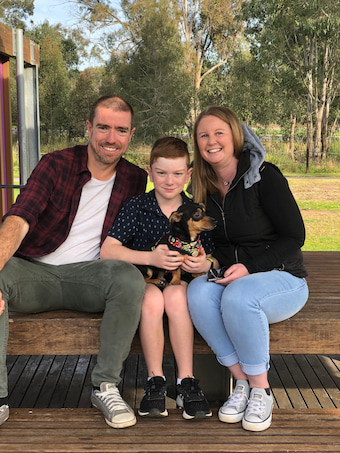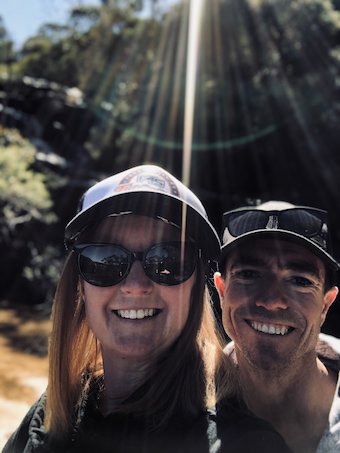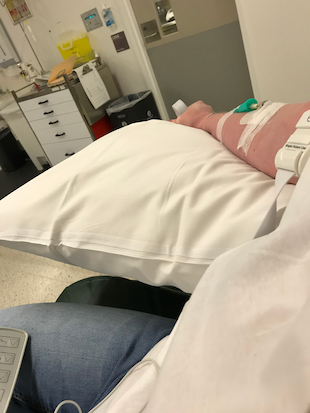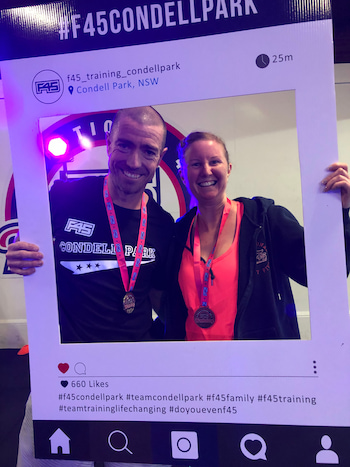Living with PV has become “a normal way of life” for Debbie
This story contains themes of fatigue and other common side effects.
When Debbie McFarlane was diagnosed with the myeloproliferative neoplasm (MPN), polycythaemia vera (PV) in 2013, she didn’t realise it was a form of blood cancer.

“PV wasn’t really explained to me at the time,” said Debbie, 41, of Sydney, who is married and has a 13-year-old son, Thomas.
Thirteen years earlier, after Debbie had a large blood clot in one leg and a pulmonary embolus [blockage of an artery in the lungs], she was diagnosed with Factor V Leiden*, a blood clotting disorder.
This was managed by her GP with warfarin, “although it was hard to stabilise my INR levels”, said Debbie about the time it took for her blood to clot.
Later, when driving to work one day in 2013, she felt short of breath. When this symptom didn’t improve, Debbie saw her GP who organised for her to have a VQ scan**, and she found out she had another pulmonary embolus (PE).
“At the time, I was working full time in an office environment, and I needed to take extended sick leave to recover. Working full-time and travelling to and from work every day was taking a toll on me physically, and eventually I was too unwell to return to my full-time position,” said Debbie.
“My GP recommended I see a haematologist for further investigations. My haematologist ordered blood tests and was able to diagnose PV.”
As part of her diagnosis, Debbie had a bone marrow biopsy, which confirmed she had the JAK2 mutation. Her twin sister also has Factor V Leiden but has not been diagnosed with MPN.
“Having already been diagnosed with a blood disorder, I was used to having health issues,” said Debbie.
She was taken off the blood thinning medication she had been on since getting the first blood clot and PE and instead was put on clexane, an anticoagulant that prevents blood clots.
“I have been on this ever since and have two injections a day.”
Not really understanding what PV was, Debbie said she “just treated it as a secondary blood disorder that needed to be managed”.
“I was happy with the haematologist I was seeing and, with a young family at the time, I was satisfied with being just ok. My family was my first priority so as long as I was well enough to care for them, I thought that was good enough.
“I became used to having low energy and being tired. I didn’t feel great but that became ‘normal’ for me and managing symptoms was how I got through,” she explained.
“Early on my PV was treated with venesections, and I also trialled hydroxyurea but I had a reaction to that so couldn’t continue with it.
“My haematologist is fantastic and continued to suggest alternative forms of treatment in order to find the right one for me.

“I am now on a fortnightly injection of Pegasys® (peginterferon alfa-2a) which is working really well. I am feeling better than I have in a long time and I no longer need to have venesections.”
“A few months after my diagnosis [with PV] I was able to start working again, in a different role,” said Debbie about the practice manager role she continues to have with an occupational therapy (OT) company.
“I gradually worked up from casual hours to full-time as my condition was being managed and I was starting to feel better.”
Today Debbie juggles two jobs. In addition to her OT practice manager job, she is also the office manager for her husband, Ian’s air conditioning business.
“I have found my new position, being able to work from home, has helped drastically as it allows me to rest when I need to,” said Debbie.
“The worst symptom for me has been low energy levels and being tired.
“It took a while to find the best treatment option for me. I have been on Pegasys for approximately four years.
“This change in medication has actually reduced the frequency of my blood tests which is a good thing, however, I believe I will be under the management of a haematologist for the rest of my life.”
“I am cautious of the activities I do in case I injure myself due to the high amount of blood thinners I am on, but I do still like to set myself challenges to complete where I feel safe.
“A few years ago, I trained for and ran 10km and completed a F45 Challenge – a 12-week nutrition and training program.
“I do find exercise challenging after having the blood clots in my leg, but I know my limits and although I can’t achieve things that others can, I try not to compare myself to others and do the best I can.
“Now, nine years later, living with PV has become a normal way of life for me.”
Debbie says, “fantastic support from my family and having a great GP and haematologist who help me understand my PV and treatment options has helped me through challenging times”.

“My main support has come from my GP who has helped me to understand and manage my symptoms. With a complex medical history, it is hard to know whether symptoms are related to my MPN,” she said.
“I try to focus on treating the symptoms, to get me through day to day, rather than getting bogged down in worrying about the underlying cause.
“I know I don’t really have a choice; this was the medical hand I have been dealt and I have two options.
“I can let my diagnosis and symptoms get me down and consume my life or I can take life day by day and live my best life in the best way possible. Some days are better than others, but I try not to let the bad days get the good days down.
“My family is always very encouraging to keep my head up when I am having a bad day,” said Debbie.
“When I have gone through hard times, I gave myself permission to rest and reset without feeling guilty about taking time for myself.
“I love being creative, helping others, and seeing things through to the end. I get satisfaction from finishing a project and organising things.
“I have recently completed a double diploma in practice management and business administration.
“This took longer than expected as I had to take a break when my medication changed due to it affecting my concentration and memory, but I just put a pause on it rather than cancelling it and was able to come back and finish it off later, when I was feeling better.”
In 2018, when Debbie was in hospital with superficial thrombophlebitis***, she was visited by one of the Leukaemia Foundation’s blood cancer support coordinators.
“During this visit I received my first booklet that properly explained MPNs and I had a bit of an ‘ah ha’ moment about my condition,” said Debbie.
She was given a copy of Myeloproliferative Neoplasms (MPN) – a guide for people with MPN and their support people.
“I’ve I used the booklet I was given all those years after being diagnosed, and online research I completed myself prior to that,” said Debbie about her sources of information on MPN.

“I haven’t accessed any support services since, apart from reading emails and newsletters from the Leukaemia Foundation.”
Debbie’s advice to others living with an MPN is to “be inquisitive and learn about it [your blood cancer diagnosis] but don’t let it rule your life. Find a good GP to help you manage your symptoms but live your life the best you can without letting it stand in your way.
“My memory isn’t fantastic, so I don’t really remember the finer details of the early stages of my diagnosis; probably a good thing,” Debbie explained.
But summarising her overall experience, she describes it as “up and down”.
“Some days are good, some days are bad. It comes in waves. The waves can last a day or weeks, but I always come through the other end, so I know things will not always be bad.”
And, regarding her future, Debbie is looking forward to the good days and to being well.
“I can never predict if I am going to wake up feeling well or unwell, so I always look forward to and am grateful for a good day.”
And among Debbie’s aspirations is “being able to travel and to see the world”.
* Factor V Leiden is an inherited blood clotting disorder due to a mutation of the blood’s factor V protein which is needed for blood to clot properly.
** Shortness of breath can be a symptom of a blood clot in the lungs and a VQ scan can help to diagnose a blood clot in the lungs.
*** Superficial thrombophlebitis (STP) refers to inflammation and clot formation in the superficial vein which runs under the skin.
Last updated on July 29th, 2022
Developed by the Leukaemia Foundation in consultation with people living with a blood cancer, Leukaemia Foundation support staff, haematology nursing staff and/or Australian clinical haematologists. This content is provided for information purposes only and we urge you to always seek advice from a registered health care professional for diagnosis, treatment and answers to your medical questions, including the suitability of a particular therapy, service, product or treatment in your circumstances. The Leukaemia Foundation shall not bear any liability for any person relying on the materials contained on this website.